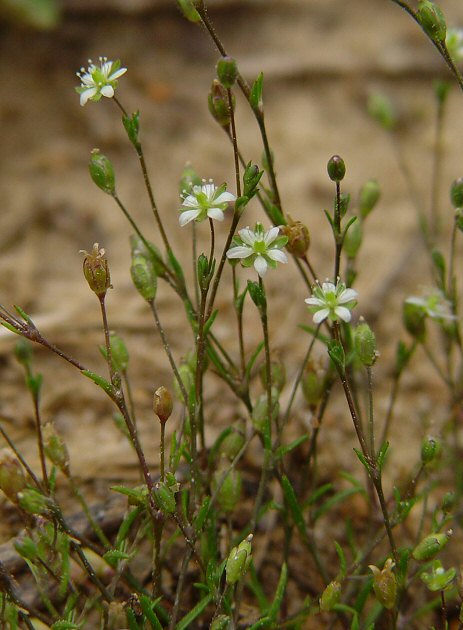Sagina decumbens (Elliott) Torr. & A. Gray
Trailing Pearlwort

Native
CC = 2
CW = 0
MOC = 44
© DETenaglia
Sagina decumbens (Elliott) Torr. & A. GrayTrailing Pearlwort | |
 |
Native CC = 2 CW = 0 MOC = 44 |
© DETenaglia |
|
Family - Caryophyllaceae Habit - Annual forb. Stems - Ascending to sprawling but usually not fully spreading, 3-10 cm long, not rooting at the lower nodes, glabrous or sparsely to moderately glandular-hairy, often purplish-tinged. Leaves - Basal rosettes present in young plants. Stem leaves opposite, fused basally into a cup-shaped, thin sheath, sessile, without axillary clusters of leaves. Stipules absent. Leaf blades 0.1-2.3 cm long, linear to narrowly triangular, somewhat stiff and leathery or sometimes softer and slightly succulent, tapered at the base, angled or short-tapered to an abrupt, minute, sharp point. Inflorescence - Terminal or axillary clusters, or appearing solitary. Flower stalks 0.5-1.0(-1.9) cm long, glabrous or glandular-hairy, erect to spreading at fruiting, at fruiting remaining relatively straight. Flowers - Sepals 5, 1.5-2.0 mm long, ovate or elliptic, often sparsely glandular-hairy toward the base, the tip and/or margins often purplish-tinged (rarely white or translucent). Petals 5, 1.5-2.0 mm long, rarely absent in flowers with 4 sepals. Stamens 5 or 10.
Fruits - 2.0-3.0(-3.5) mm long, the sepals appressed to the mature fruits. Seeds (0.2-)0.3-0.4 mm wide, the surface smooth, pebbled, or tuberculate.
Flowering - March - August. Habitat - Glades, rock outcrops in upland prairies, forest openings, fields, pastures, roadsides, cracks in pavement, and open, disturbed areas. Origin - Native to U.S. Lookalikes - S. procumbens. Other info. - This little species is found in scattered locations in the southern half of Missouri, and throughout the southeastern quadrant of the continental U.S. The plant is easy to overlook but is quite striking while in flower, despite its minute size. S. decumbens is easy to identify due to its thin opposite leaves, white flowers, and decumbent stems. Photographs taken in Clermont, FL., 2-12-03, and in Auburn, AL., 3-26-05 and 5-10-05. |